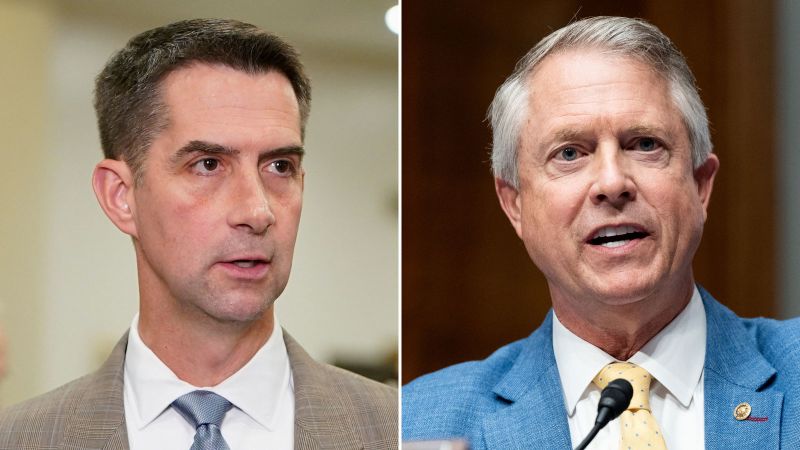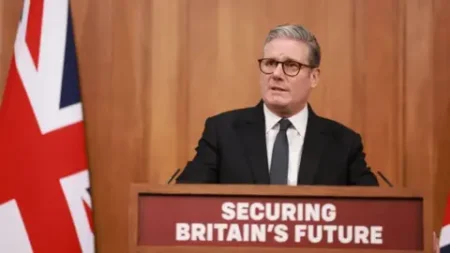The recent classified briefing held on Thursday by congressional leaders has sparked a significant divergence in opinions between Democratic and Republican senators regarding the impact of U.S. military strikes on Iran’s nuclear capabilities. After the briefing, which was highly anticipated following the airstrikes that aimed to weaken Iran’s nuclear ambitions, various senators expressed their differing views on the extent to which the strikes affected Iran’s progress toward developing nuclear weapons.
Republican senators emerged from the briefing with a largely unified stance, claiming that the strikes had extended the timeline for Iran’s ability to build a nuclear weapon by several years. However, they also recognized that the threat posed by Iran is not entirely eliminated. Conversely, Democratic senators presented a considerably more skeptical viewpoint. Some indicated that the strikes may have only delayed Iran’s development of nuclear weapons by a matter of months rather than years, highlighting the ambiguity surrounding the strikes’ effectiveness.
An early U.S. defense intelligence assessment was revealed during the briefing, which suggested that the military action had not succeeded in destroying critical components of Iran’s nuclear program. Instead, it merely set back their developments by mere months. CIA Director John Ratcliffe contradicted this assessment a day later, asserting that credible intelligence indicated significant damage to Iran’s nuclear program, claiming that several key facilities were destroyed and would require rebuilding over an extended period. This discrepancy raised questions about the reliability of the intelligence showcased during the briefing and the differing interpretations among intelligence and defense officials.
Senator Chris Murphy of Connecticut articulated his concerns, asserting that while the strikes inflicted some damage on the Iranian nuclear program, the idea that it was completely obliterated appeared unreasonable. Murphy firmly stated that claims of irreversible destruction seemed exaggerated and reiterated that Iran still possessed considerable capabilities. Similarly, Senate Minority Leader Chuck Schumer voiced his skepticism regarding the administration’s assertions, demanding clarity on the president’s claims and criticizing the lack of a coherent strategy to prevent Iran’s emergence as a nuclear power in the future.
The briefing, attended by prominent figures including Secretary of Defense Pete Hegseth, Secretary of State Marco Rubio, and Chairman of the Joint Chiefs of Staff General Dan Caine, aimed to clarify the ramifications of the U.S. strikes. While Republican senators touted the effectiveness of the strike, some began to display caution regarding the phrasing used to describe the results, with figures such as Senator John Cornyn recognizing the ambiguity inherent in terms like “obliterated.”
Attendee Senator Josh Hawley reported that the briefing provided substantial insights into the intelligence gathered post-strike. He expressed support for the military mission, believing it had reached its objectives. Meanwhile, other Republican senators echoed the CIA Director’s more tempered view, acknowledging that rebuilding Iran’s facilities would take considerable time and raising concerns about the exact damage inflicted.
On the Democratic side, some senators were more reserved or declined to take a definitive position on the effectiveness of the strikes. Senator Chris Coons from Delaware argued for a more comprehensive assessment before drawing conclusions about the operational status of Iran’s nuclear program.
Concerns about the premature conclusions drawn from the early assessments were echoed by Senator Mark Warner, who emphasized the importance of waiting for a complete and thorough evaluation of the strikes. He pointed out the potential risks associated with providing a false sense of security to the public if the initial assessments were overly optimistic or inaccurate.
In summary, the briefing has underscored the partisan divisions in Congress regarding foreign policy and military engagement, particularly with Iran. Amid conflicting reports and analyses from intelligence agencies and government officials, the extent of the damage inflicted on Iran’s nuclear ambitions remains a contentious issue, requiring further scrutiny as new intelligence emerges. As lawmakers navigate these discussions, the administration’s overarching strategy to combat potential nuclear threats from Iran continues to be under scrutiny both domestically and internationally.











